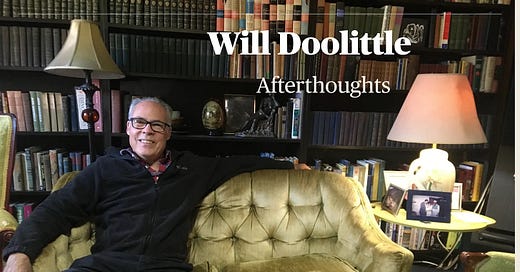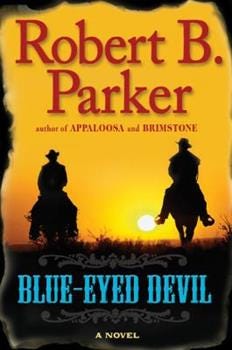Cleaning up my psychic closet
Considering Robert Parker and the effects of success
You know you need therapy when you keep telling yourself you don’t need therapy.
After a dismal autumn when my back collapsed and a difficult winter spent hobbling from the couch to the kitchen, my body had begun to heal. A kind chiropractor and a knowledgeable physical therapist have helped. So did a cortisone shot.
“Feeling any pain?” The doctor said as he gripped the needle and began injecting what felt like a cup of cold white sauce into my lower back.
“Um … yes,” I said. “Down my leg.”
“Is it pain or pressure?” he said.
“It’s pressure,” I said, “which is painful.”
“All done!” he said.
At the same time, I’ve been trying to fill my role as Bella’s companion and caregiver, which would have been impossible without all the help that has come in from family members and others.
Alzheimer’s never quits — you can’t ask for a break — and if it weren’t for people visiting and bringing us food and taking over our chores, we would have had to call 911 for the dog hair alone.
But I’m on top of the vacuuming now and even cleaned out the closet under the stairs a few days ago. Harry Potter wasn’t in there but many lost shoes were, along with several couch pillows, jackets I’d never seen, camera equipment, eight or nine handbags, snowboard boots, hiking boots, a large snow scraper, the leaves for our dining room table and another whole table (with leaves and legs separate) and a collection of maps from the 1950s left by the previous homeowner that I spent two hours examining.
I could have run a garage sale out of that closet.
So I’m great, except I had this notion (probably wrong, said an interior voice) that I needed some emotional therapy to go with the physical. Probably unnecessary, said the voice.
But I had recommendations from a couple of different people for the same therapist, and I tried an hour, about half of which I spent crying and the other half struggling not to cry.
A week later, I took up where I’d left off, and I’ve gone to four or five sessions, managing to get a few words in between the tears and to listen here and there to the therapist. Her suggestions come as reflections, showing me myself.
I realize now I had a space full of grief and stress and frustration and other knickknacks in a hidden (but capacious) corner of my psyche.
“Nothing much in there,” I’d tell myself.
Some people had been saying for years I really should actually, you know, go and talk to someone. I thought they meant someone in my situation should do that, in general — it could be helpful — but not me specifically, because I was fine.
Somehow, that capacity for denial and delusion shrinks down inside the therapist’s office, where permission is given for the truth to be spoken, and something in the atmosphere draws it out.
I have rarely felt I needed something as much as I need these visits. I look forward to them.
The feeling that these sessions are like the valve on a pressure cooker, opening just in time, will fade. But the benefits will remain.
I started this column by trying to sink into the “Alzheimer’s Chronicles” frame of mind — somber and reflective, holding onto hope in the midst of despair.
But I found I couldn’t do it. It’s spring, the tulips are out, birds are flashing by the window. Life is good — hard but good — and help is available.
Readings
I grabbed a Robert Parker book at a garage sale on Friday — “Blue-Eyed Devil,” one of his last novels — and I’m almost done with it now, on Saturday morning, which says more about the compression of his style and brevity of his books than my speed or dedication in reading them. I’m mildly obsessed with Parker, having started reading the Spenser private eye novels in the early 1980s and continuing with those and a smattering of his Jesse Stone novels for about 20 years, when I got disillusioned with all of the compromises he makes for commercial appeal. His early books were a bit clunky, then he hit his stride and turned out some wonderfully entertaining ones. Spenser was a great combination of smart-ass and tough guy, with a menacing friend, Hawk, but a strong moral code. But after 15 or 20 books, the series became formulaic. The clunkiness was gone but so were the quirkiness and depth — everything but the tried and true scenes of confrontation and male bonding and sex with his paramour, Susan, was stripped away. Chapters got shorter, and the point size larger.
Five years before his death in 2010, he wrote “Appaloosa,” a western that recaptured some of the fun and surprise of his earlier Spenser novels. “Blue-Eyed Devil” is the fourth in that final series, starring gunfighters Virgil Cole and Everett Hitch, and, unfortunately, it already feels tired. The chapters are a few pages long, the type so big it borders on a large-type edition, and the writing too willing to fall back on cleverness and quips. “Appaloosa” had an enigmatic quality, with Cole questioning whether killing people — even when they deserved it, even when they were given a chance to walk away — was a good way to make a living. But the questions feel perfunctory in “Blue-Eyed Devil,” a way to justify the inevitable deaths of whoever stands up to Cole. We can’t care much about these victims, because the book doesn’t allow space for us to know them. Cole knocks them down like ducks in a shooting gallery, and in the end, which I haven’t reached yet, I suspect my prize as a reader will feel as rewarding as it would at a carnival — a cheap stuffed animal worth less than I paid for the book.






Will Doolittle spent years telling the personal and sometimes tragic stories of other people. When Bella and Willa embarked on “The Alzeheimer’s Chronicles,” they opened up their own personal challenges for inspection. The truly great journalists have an honesty and a bravery. And that is what we are seeing here. Goodspeed my friend.
Bravo. For the courage to express this humanity and for your caregiving. Neither is easy; both are essential.